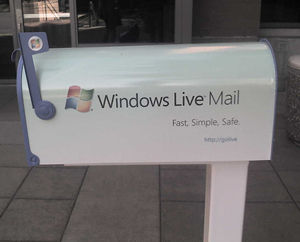
Windows Live Mail mailbox in Redmond, WA
I joined the Open University (OU) as an Associate Lecturer (AL) back in May 2000 to teach the university’s T171: You, Your Computer and the Net course, the university’s first large-scale foray into online teaching. As one of hundreds of new ALs, I was thrown into the world of FirstClass, the university’s chosen platform for collaboration and discussion in its courses, and among its students and associate lecturers. If you haven’t already heard, the death knell for FirstClass has been sounded. I believe the transition away from FirstClass for courses is expected to be complete by October 2010. As part of that transition, our e-mail accounts need to go somewhere, but where?

Sample Google Mail Spam Folder
If you’re a student, you may already be using your own personal, non-OU e-mail address at the university. If you’re an associate lecturer or other academic/support staff, having a .open.ac.uk e-mail address is an important part of your professional identity. According to David Wilson, director of strategic planning in LTS, a choice is being considered between Google Apps Education Edition and Microsoft Live@edu and should be made shortly (in Snowball 36 – November 2009). It will definitely be put into place for students, but it may extend further than that. The decision has not yet been made, so we have a very small window of opportunity to provide some input as to our preferences. I’ve constructed a very small, unofficial survey at SurveyMonkey to do that.
Both of the cloud offerings offer considerably more functionality than just e-mail. Google Mail’s been joined by Google Docs, instant messaging, and calendars. Microsoft’s HotMail has been combined with Outlook Live, a remote file locker, calendaring, instant messaging, and Microsoft Office workspace to share documents. If you’re not familiar with some of these systems, here are some resources:
- Google Apps Education Edition
- Google Mail About
- Microsoft Live@edu
- Microsoft Live@edu’s Outlook Live/Hotmail Live E-mail Service Features
- Educause’s “7 Things You Should Know About Google Apps” (March 2008)
- Google Apps for Education vs Microsoft’s Live@edu
(3-part blog series): Part 1, Part 2, and Part 3 (Thanks, Lynn, for Part 3 pointer).
The survey is open to any Open University community member, whether staff, consultant, or student. The survey will run between November 22nd and November 29th. I’ve specifically asked in the survey about your role, because I recognise that different university community members will have different needs. The survey results, broken down by role, will be forwarded onto the senior decision-making committee. I can’t guarantee how much attention they’ll pay, but the more of us who participate, the stronger the impact our voice and preferences will have.
You may feel you don’t know enough to make a choice between the two systems on offer. That’s OK, too. There’s a choice in the survey to indicate that or even that you don’t care either way.
No personal details, not even your IP address, will be collected and stored with the survey. It’s completely anonymous. It’s also unofficial. I’m doing this because I think we should have some sort of say and I’m motivated to provide a mechanism, however imperfect, to provide at least an indication of our preferences as a community. Comments or questions can be directed to me on this blog entry or via @Eingang on Twitter.
You’ll find the survey at the short URL of http://tr.im/OUinCloud. I hope you’ll participate. Feel free to point people at this blog entry, re-tweet the survey or blog address, or otherwise let as many of your fellow students and OU associates know about the survey. We only have a week and more participation is better, so let’s make it count!
Thanks!
Michelle A. Hoyle,
Open University Associate Lecturer and postgraduate student
Shortcuts:
- The survey: http://tr.im/OUinCloud or http://www.surveymonkey.com/s.aspx?sm=IztCuXuYgqMj_2bVFGct_2f8Qg_3d_3d if the tr.im URL isn’t working.
- This entry: http://tr.im/OUCloudBlog
Images:
- Windows Live Mailbox:
- Google Mail Spam Folder: Michelle A. Hoyle







